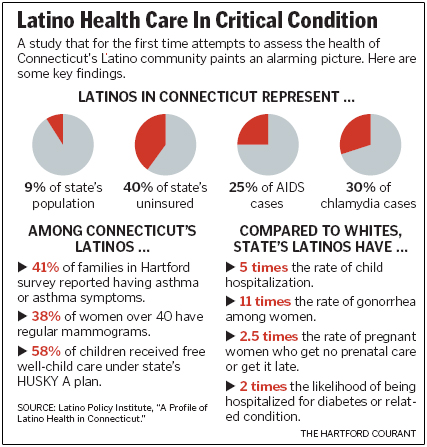 |
 |
|||
|
||||
| Web Sites, Documents and Articles >> Hartford Courant News Articles > | ||
|
Unhealthy Diagnosis December 13, 2006 Connecticut Latinos are sicker and likely to die younger than members of any other ethnic group in the state, according to a study examining the health of the state's Hispanic population. "The state of Latino Health in Connecticut is in crisis," is the opening line of a study released Tuesday by the Hispanic Health Council, which for the first time attempted to isolate Connecticut residents of Spanish descent and take their collective temperature.
Among Latinos, the study also found high incidences of diabetes, dental problems and sexually transmitted diseases. It also found that a language barrier remains a serious problem in getting care. "The Latino population is a large group of people that [is] suffering disproportionately," said Jeannette B. DeJesus, executive director of the Hartford-based Hispanic Health Council. After years of running health care and education programs for Latinos, DeJesus said she and others have long suspected that the community was in dire need of better health care. But until now, numbers never existed to support that observation. That situation began to change last year when DeJesus sought support from the Universal Health Care Foundation, a New Haven-based group pushing for health care for all. The foundation is headed by Juan Figueroa, a civil rights lawyer and former state legislator who traces his roots to Puerto Rico. A lunch meeting led to funding and formation of the Latino Policy Institute within the Hispanic Health Council. Its first project was the report, "A Profile of Latino Health in Connecticut," which for the first time attempts to put statistics behind long-held suspicions. Figueroa said that the findings will become crucial in the upcoming legislative session when lawmakers are expected to follow the leads of neighboring Maine and Massachusetts and attempt to create some kind of universal health insurance program for Connecticut residents. "We hope Latinos are in the front of the bus in terms of universal health insurance, instead of the back of the bus," Figueroa said Tuesday. Although the report paints a bleak picture, DeJesus acknowledged that it remains woefully incomplete. Not all health statistics account specifically for people of Hispanic origin. And even if Latinos are counted, the information can be misleading. For example, Puerto Ricans, Mexicans and Dominicans are likely to have distinct cultural, dietary and lifestyle habits that might affect each group's health differently. But although subtle differences certainly exist among Latino groups, the report also illuminated universal contributors to the gap in health status between Latinos and the rest of the state. A dearth of medical interpreters remains a major barrier to care for non-English speaking patients. Although a federal law directing hospitals to provide qualified language interpreters is 40 years old, grade-school children and custodians still are often on the front line of efforts to bridge the language barrier between patients and professionals throughout Connecticut. The report found that 44 percent of Latino adults report that they usually or sometimes have a hard time understanding the doctor because of language issues. Although the advocates acknowledge that the report is just a first step in identifying the problems, it also illuminates, they say, the need for sweeping changes to the very fabric of our society if the lives of Latino residents are to improve. Poverty, the report says, is at the root of many of the problems. The report calls for programs that offer better opportunities and higher wages for Latinos. The group also supports universal health coverage and better education for Latino residents. DeJesus acknowledged that the proposals would be tremendously expensive, but said that caring for a population of obese, uneducated, poor and chronically ill residents might be even more costly. For too long, DeJesus said, Latinos have been silent. It is time for them to step forward and push for improvements to their health and lives, she said. "The report begins to give you a profile of Latinos in the state of Connecticut," DeJesus said. "We hope to connect the voices of those people to the profile."
|
||
| Last update:
September 25, 2012 |
|
||
|

